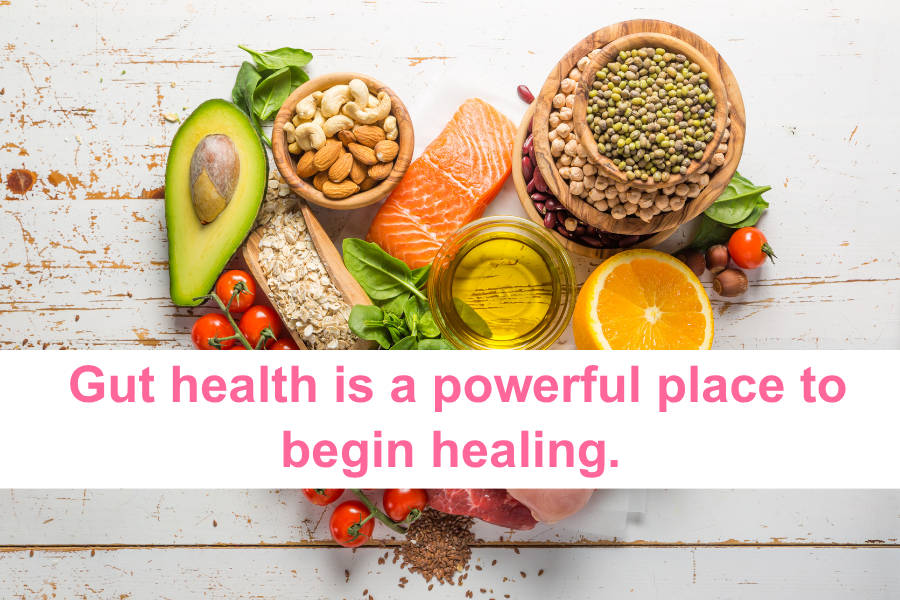Black mental health and gut health are deeply connected, and that connection is shaped by biology, trauma, and… generations of stress.
In this post, we’re diving into the powerful link between the gut and the brain, why it matters for Black communities, and how you can begin healing from the inside out.

More Than Just Self-Care…
There’s a deeper conversation to be had when we talk about Black mental wellness. It goes beyond surface-level self-care.
One area we need to pay close attention to is gut health. What’s happening in your gut is directly connected to what’s happening in your mind. This relationship, known as the gut-brain connection, also referred to as the gut-brain axis plays a major role in how you experience stress, mood changes, and overall mental well-being.
And for us in the Black community, this connection is even more profound.
The “weight of generational stress” — trauma, adversity, and systemic challenges passed down through generations doesn’t just stay in the mind. It settles in the body too. That stress can disrupt gut health, which then affects your mental clarity, mood regulation, and emotional resilience.
Understanding this link will help you view mental health through a fuller lens, one that includes your biology, history, and lived experience.
Healing, then, becomes about more than just coping. It’s about caring for both mind and gut, breaking harmful cycles, and honoring the strength carried through your bloodline.
🧠💥 Yes! It’s time to unpack how your gut and your generational story are connected and why that matters now more than ever for your mental wellness.
Because this isn’t just science, it’s healing. It’s liberation.
And that’s just a glimpse of what we’re diving into in this post. Let’s explore a little deeper.

Your Gut Is Your “Second Brain”
You’ve probably heard someone say, “go with your gut.” And if you’ve ever felt butterflies in your stomach before a big moment, you’ve already experienced the gut-brain connection in action.
But it goes way beyond just feelings in your belly.
Your gut houses a complex network of nerves called the enteric nervous system (ENS). This system communicates constantly with your brain through what scientists call the gut-brain axis, a two-way communication highway between your gut and your central nervous system.

Here’s the fascinating part: about 90% of your body’s serotonin, the neurotransmitter often called the “feel-good” chemical, is actually produced in your gut by the trillions of bacteria living there, known as your microbiota. (Source)
These microbes also produce other important neurotransmitters like GABA, which help regulate mood, focus, and how your body responds to stress.
Now, here’s where it gets personal. Black people report higher levels of chronic stress and stress-related illnesses compared to other groups.
This chronic stress can disrupt the delicate balance of the gut-brain axis, leading to increased inflammation, anxiety, and depression. (Source)
These are 5 common gut issues that disproportionately affect Black communities and why they matter for your mental health:
✴️ 1. Irritable Bowel Syndrome (IBS)
- What it is: A chronic disorder of the large intestine often worsened by stress and microbiome imbalance.
- Mental health link: IBS is tied to anxiety and depression; stress worsens symptoms, creating a painful cycle.
- Why it matters for Black health: Many Black patients are misdiagnosed or overlooked in clinical settings. Racism-related stress also intensifies symptoms.
✴️ 2. Leaky Gut (Increased Intestinal Permeability)
- What it is: The gut lining becomes too porous, letting toxins into the bloodstream.
- Mental health link: Inflammation from leaky gut can cause brain fog, mood swings, and low energy.
- Why it matters for Black health: Chronic stress and low access to fresh foods (due to food apartheid) wear down the gut lining over time.
✴️ 3. Small Intestinal Bacterial Overgrowth (SIBO)
- What it is: An overgrowth of bacteria in the small intestine that interferes with nutrient absorption.
- Mental health link: SIBO is associated with fatigue and low mood due to nutrient deficiencies (especially B12 and magnesium).
- Why it matters for Black health: Limited access to gut specialists and insurance often delays diagnosis. High-stress lifestyles and poor sleep also contribute.
✴️ 4. Candida Overgrowth
- What it is: An imbalance where yeast (Candida albicans) overgrows in the gut.
- Mental health link: Linked to anxiety, brain fog, irritability, and even panic attacks.
- Why it matters for Black health: Higher rates of Type 2 diabetes rooted in structural food inequities create a gut environment where Candida thrives.
✴️ 5. Lactose Intolerance
- What it is: Trouble digesting dairy products, causing gas, bloating, or inflammation.
- Mental health link: Ongoing gut discomfort disrupts sleep, energy, and mood.
- Why it matters for Black health: Up to 80% of African Americans are lactose intolerant, yet dairy is still pushed in mainstream health messaging.
These aren’t just stomach issues.

Your gut holds memory. When it’s inflamed, unbalanced, or ignored, your joy, peace, and mental clarity become harder to access.
Generational Stress, Epigenetics & Black Bodies
The long shadow of slavery, systemic racism, and structural violence doesn’t just live in history books… it lives in our bodies. Today, science confirms what many in Black communities have always felt: trauma can be passed down. This isn’t just emotional. It’s biological. It’s epigenetic.
What Is Epigenetics?
Epigenetics is the study of how behaviors and environmental factors like chronic stress, trauma, racism, and diet can affect how our genes are expressed. These changes don’t alter the DNA sequence itself, but they can turn genes “on” or “off” through chemical modifications (like DNA methylation or histone modification). This can impact how the body functions, influencing things like mood, digestion, immunity, and disease risk.

Even more significantly, some epigenetic changes can be passed down to future generations, meaning the effects of stress or trauma can ripple through family lines.
Research on Holocaust survivors and their children showed that trauma can leave a biological imprint. That same science helps explain how the trauma of slavery, Jim Crow, and ongoing racial injustice continues to affect Black people today at a cellular level. (Source)
The Body Remembers…
Generational trauma doesn’t just live in the mind; it lives in cortisol levels, blood pressure, gut health, and immune function. Chronic stress from historical and ongoing racism reshapes the gut-brain connection. This can lead to digestive problems, mood swings, anxiety, and depression.
The body keeps the score. The gut keeps the receipts.
How Today’s Stressors Show Up in the Body
Even now, modern stressors rooted in anti-Black systems continue to harm our health especially our gut and mental health. For example:
- Racial Trauma & Microaggressions
Every day racism, from workplace bias to constant code-switching, keeps the body in fight-or-flight mode. This “weathering” damages the gut lining and weakens resilience over time. - Environmental Racism
Toxic water, air pollution, and limited access to green space in Black neighborhoods disrupt gut health, increase inflammation, and wear down the immune system. - Economic Pressure & Hustle Culture
Juggling jobs, financial stress, and survival mode often mean skipped meals, processed food, and poor sleep. That adds up to gut imbalance and burnout. - Medical Racism & Dismissal
Black people, especially women, are more likely to have their symptoms ignored. Digestive issues and pain are often overlooked or misdiagnosed, deepening mistrust and stress. - Overexposure to Black Trauma Online
Constant videos of police violence or racial injustice trigger real trauma responses—affecting appetite, sleep, and gut balance. - Cultural Disconnection
Pressure to assimilate and the loss of ancestral practices can leave a deep sense of disconnection. That grief shows up physically—especially in the gut.

Here are some ways to start restoring balance:
✨ 1. Eat to Feed Your Gut-Brain Axis
- Prioritize fiber-rich foods like leafy greens, oats, flaxseeds, and berries
- Include fermented foods like kimchi, sauerkraut, or dairy-free yogurt
- Choose healthy fats (avocados, olive oil, nuts) to support brain function
- Limit ultra-processed and high-sugar foods that disrupt the microbiome
✨ 2. Move to Release Stored Stress
Physical movement helps regulate the nervous system and support digestion. You don’t need to do high-impact workouts, gentle movement like:
- Walking
- Dancing
- Yoga
- Stretching
can help the gut and mind reset.
✨ 3. Get Curious About Your Family History
Ask yourself:
- What health issues run in my family?
- How was stress or trauma handled in my household?
- What narratives around wellness were passed down to me?
This self-inquiry helps you separate what’s yours to carry and what you can begin to let go of.
✨ 4. Practice Nervous System Regulation
Support your vagus nerve, the main communication line between gut and brain by:
- Deep breathing
- Humming or singing
- Cold plunges or cold showers
- Mindful rest
These practices help bring the body out of survival mode.
✨ 5. Seek Culturally Competent Care
Work with wellness professionals who understand the impact of race-based stress and generational trauma on the body.
This might include:
- Functional medicine providers
- Trauma-informed therapists
- Integrative nutritionists
Final Thoughts: Healing Is a Revolutionary Act
You are not just healing for yourself — you are healing for those who came before you, and for those who will come after you.

Understanding the connection between gut health and generational stress gives you more than knowledge. It gives you power.
Power to break patterns.
Power to feel whole.
Power to thrive.
+ show Comments
- Hide Comments
add a comment